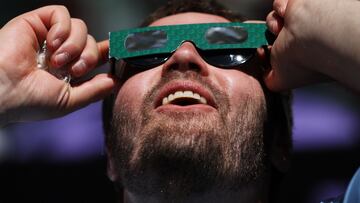Why do my eyes hurt? The effects of looking at the solar eclipse without glasses
Looking directly at an eclipse without appropriate eyewear can lead to eye damage called solar retinopathy which has a range of symptoms.

Internet searches on Google for ‘My eyes hurt’ and ‘Why do my eyes hurt’ spiked after the solar eclipse that was visible from parts of the U.S. on Monday, April 8, including in certain places a full solar eclipse.
Looking at a solar eclipse at any time except during the very brief totality phase when the moon completely blocks the sun’s rays, is highly dangerous unless specialised eclipse glasses are worn. To be entirely safe it is best to watch the entire eclipse through eclipse glasses or a portable solar viewer.
Eye damage caused by unprotected eclipse viewing
According to Prevent Blindness “exposing your eyes to the sun without proper eye protection during a solar eclipse can cause ‘eclipse blindness’ or retinal burns, also known as solar retinopathy.”
Symptoms of solar retinopathy
According to the Cleveland Clinic, where the solar retinopathy is mild, the following symptoms include:
- Watery eyes (known as epiphora)
- Headaches
- Sensitivity to light (known as photophobia)
Where the solar retinopathy is more severe, the following symptoms may be experienced.
- Blurred vision
- Blind spots in your line of sight (called Scotoma)
- Issues with sight, including objects appearing smaller than they actually are (micropsia), straight lines may appear curved (metamorphopsia) along with eye floaters or flashes.
- Eye pain
Note that the eye pain is not experienced when the damage occurs, the soreness and other symptoms appear after the exposure and can appear hours or even days after viewing the sun.
Can looking at an eclipse cause blindness?
Solar retinopathy can cause blindness, though this is rare. The more prolonged, frequent and direct the sun exposure is the more damage that will be done to the retina. If it is severe enough it can lead to blindness.
Diagnosis of eye damage after the eclipse
If anyone has looked directly at the eclipse and is suffering symptoms of retinopathy they should seek an appointment with a qualified ophthalmologist at the earliest opportunity. They will carry out a full eye examination, including a review of the retina with the eye dilated to diagnosis any problems. These tests allow the medical professional to see any damage and irregularities on the retina.
Treatment for solar retinopathy
Eye care specialists can help manage the symptoms of solar retinopathy. If you have photophobia, avoid bright lights, including screens and sunlight. Wearing sunglasses may help.
For headaches and eye soreness over-the-counter pain medication may help, but always check with your medical provider before taking medication.
In general in mild cases, healing happens by itself and vision would be expected to return to normal within one to six months. The worse the damage the worse affected the vision will be and the longer it will take to heal. In severe cases the vision may be permanently impaired.
How many people suffered eye damage in the 2017 eclipse?
In the solar eclipse of 2017 it is estimated that over 150 million people viewed either the total or partial eclipse. According to Ralph Chous, an eclipse eye safety specialist who works at the University of Waterloo in Canada, there were less than 100 cases of eye damage reported across all of Canada and the U.S. Of course there may have been more, with people possibly not seeking treatment for minor cases, and not all the cases seen by medical professionals were written up for journals.
Chou says that even for people who suffer significant blurring on the day after the eclipse around half will likely recover almost completely.






